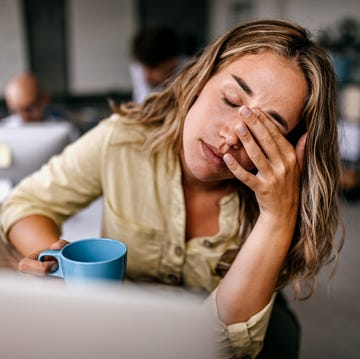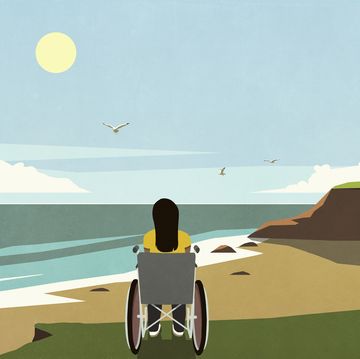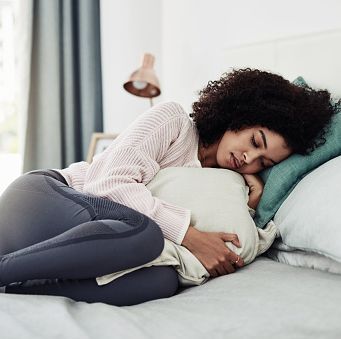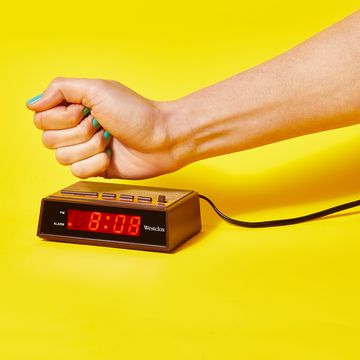Whether you've just started your period or have had it for years, it can be totally nerve-wracking when it's late or irregular. Your mind might immediately jump to pregnancy (if you're sexually active) or a serious medical condition (if you're not). But there are actually a bunch of different reasons why your period might be out of whack.
We talked to Jennifer Ashton, M.D., a New Jersey-based gynecologist and the author of The Body Scoop for Girls: A Straight-Talk Guide to a Healthy, Beautiful You, about the different factors that can cause your period to get off track and when you should be concerned. Ashton also cleared up some common misconceptions about irregular cycles: Stress, poor diet, and frequent travel or exercise don't normally affect your period. Remember, if you're concerned about what is or isn't going on with your cycle, talk to your doctor.
Here are 8 possible reasons you're not getting your period on the regular.
1. You're tracking it wrong (or you're not tracking it at all).
If your menstrual cycle is healthy, the first day of one period and the first day of the next period should be between 21 and 40 days. But if you don't track your period, there's a chance you might not even notice you're irregular. It's tough remembering exactly when you got your last period, so if you don't use a period tracker app on your phone already, download one now to best stay on top of your health. Period Tracker Lite is free on iOS and Android, and it's easy and discreet to use.
2. You're underweight.
While there's no minimum weight or body mass index (BMI) required to menstruate, you do need a certain percentage of body fat in order to have regular periods. "You can think of that very logically from an evolutionary standpoint," Ashton explains. "If a woman is underweight, her brain thinks she's in a situation of famine, so it's not the best time to reproduce."
You might have heard that highly athletic women with low body fat sometimes lose their periods. While this is biologically possible, most women who are working out at the gym won't experience this unless they're doing something extreme, like training for a marathon or triathlon.
If you suffer from an eating disorder or are concerned that your weight may be interfering with your cycle, talk to your doctor.
3. You have polycystic ovarian syndrome (PCOS).
PCOS is a disorder that causes your body to make the right types of hormones, but in the wrong ratios. Doctors aren't sure if it's caused by genetics or if there's a specific trigger, but women with PCOS often have periods that are very spaced out — six to eight weeks apart, or even longer — or irregular for more than a year after their first cycle, because their hormone imbalance causes overactivity in the ovaries. Other symptoms of PCOS include weight gain, oily skin or acne, depression or mood swings, and hair loss or hair growth. If you happen to have any of these symptoms, you don't necessarily have PCOS, but if you experience a few or more and are concerned you might have it, talk to your doctor.
4. You just started taking a form of hormonal birth control.
The Pill, the patch, the NuvaRing, the Depo-Provera injection, and most types of the IUD are all forms of hormonal birth control, which changes the levels of estrogen and progestin in your body that affect your period. It can take awhile for your body to adjust, especially if your cycle was irregular to begin with.
In addition to lowering your risk of pregnancy, hormonal birth control is often prescribed to women with really irregular periods to help make their cycles more predictable and comfortable. But because every body is different, it can take some trial and error to figure out which form of hormonal birth control works best from you.
"Most birth control pills (if not all) will 'regulate' a period in time. It's just a matter of finding the right pill that works for that particular woman," Ashton says.
5. You're not taking the Pill properly.
Birth control pills come in two types: monophasic, where every pill in the pack is the same, and triphasic, which has a variety of active pills (containing different types and levels of hormones) and placebo pills (which don't include hormones). If you take triphasic birth control, you bleed during the week you take the placebo pills. But if you skip the placebo pills, you won't bleed.
It's also important to take the Pill at the same time every day, without missing a day. "If you miss pills or skip days or take it at widely variable times during the day, that can cause irregular bleeding," Ashton says. It can also make the Pill less effective.
Need clarification on how to take the Pill properly? Talk to your doctor. Remember, there are several different types and brands of the Pill, so you need to be sure you're taking it as directed.
6.Your cycle is syncing up with another woman's.
If you live with other women who menstruate, like your mom, a sister, or a roommate, there's a good chance you'll eventually wind up on the same cycle, Ashton says. Scientists don't know why this happen, but it's incredibly common — and it explains why you might get your period on a day you didn't expect.
7. You're taking certain medication.
If you're taking meds for depression, anxiety, bipolar disorder, or another psychiatric disorder, they could potentially disrupt your cycle. "The more medications you're on, the more potential there is for irregular bleeding," Ashton says.
This doesn't mean you should go off your meds without consulting your doctor. Ask your doctor about your options — you might be a good candidate for hormonal birth control, like the Pill or an IUD.
8. You're experiencing vaginal bleeding, but not because of your period.
Not every instance of vaginal bleeding is a result of your period. In extremely rare cases, you might bleed due to an infection, a tumor, a bleeding or clotting disorder (such as Von Willebrand Deficiency), or a foreign object inserted into your vagina. One way to determine if you're bleeding because of your period or for another reason is to track your cycle, but if you have concerns, speak with your doctor.

Hannah Orenstein is the author of several novels, including Meant to Be Mine (out June 7, 2022), Head Over Heels, Love at First Like, and Playing with Matches. She's also the Deputy Editor of Dating at Elite Daily. She lives in Brooklyn.













